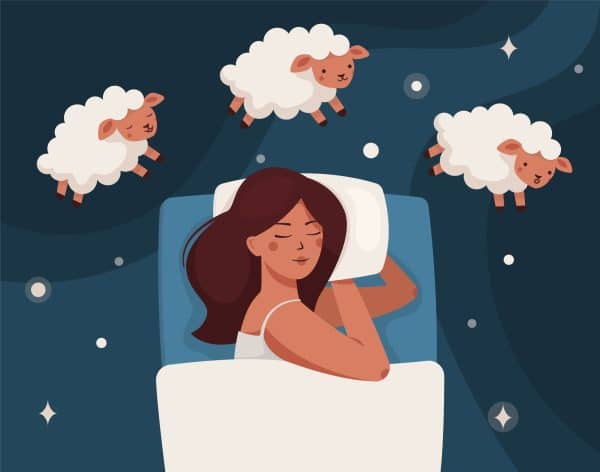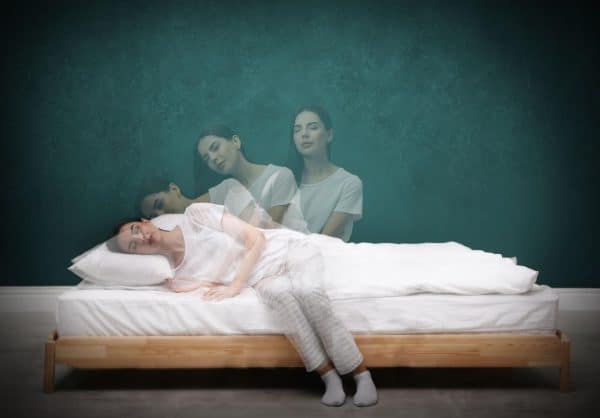Old Wives’ Tales About Sleep
Myth or Fact?
The Daily Doze
There are a lot of beliefs surrounding slumber, ranging from outdated medical advice to superstitious old wives’ tales.
However, before you put “everything you thought you knew” to rest, remember that there may be a grain of truth to some of the myths and superstitions about sleep..
Here are five commonly held beliefs about sleep -- and we’ll tell you whether it’s pure myth or there may be some scientific basis that backs it up.
1 - “Sleeping with Wet Hair Can Make You Sick”
Have you ever skipped a nice, warm bath before bedtime because you were too tired to blowdry your hair? Sleeping on a wet head is a cause of concern among mothers and grandmothers. It is believed you could catch a cold because the body heat can escape through the head. Some cultures even believe it can cause blindness!
The Verdict: Myth. Colds are caused by viruses spread through air droplets by touching a contaminated surface or when an infected person speaks, sneezes, or coughs.
Sleeping with wet hair can cause some discomfort during sleep because of lying on a wet pillow. This can increase your risk of hair breakage, or a fungal infection because a wet pillow provides an ideal breeding ground for mold and micro-organisms.
2 - “Counting Sheep Will Help You Fall Asleep”

We’ve been told by elders and viewed it in cartoons: if you can’t sleep, count sheep. Some believe the saying originated several centuries ago when shepherds who couldn’t sleep counted their sheep to make sure none were missing. Does the tactic really work in giving you some Zzz’s?
The Verdict: Fact. Although this piece of advice may sound silly, there may be some truth to it. Essentially, counting sheep is a form of meditation. It is a menial task to give your busy mind something to do to rid it of other distractions. The simple and monotonous activity of counting (imaginary) sheep can help calm the mind and in turn, help you fall asleep.
Whenever you lay in bed, try to have zero distractions or external stimuli. Counting helps you control what your mind is focusing on instead of letting your thoughts roam free.
(Also Read: Sleeping with Pets: Tips for Quality Rest)
3 - “A ‘Nightcap’ Helps You Sleep”
A cocktail or alcoholic drink before bed is referred to by many as a ‘nightcap’, an expression dating back to the 18th century, when people wore nightcaps as a way of warming themselves and thus helping them get to sleep.
Alcohol is believed to help us fall asleep because it is a downer or depressant. Some swear by it — such that they make it a nighttime regimen to partake in a glass or two of wine before dozing off.
The Verdict: Myth. It’s time to dispel this anecdote for good! Avoid alcohol at least two hours before you sleep.
The quality of sleep you achieve is impacted negatively by alcohol. Firstly, alcohol can mess up your circadian rhythms, our bodies' biological clocks. Drinking before bed can disrupt your sleep several times during the night, usually for bathroom breaks.
Alcohol can also affect the restorative properties of your sleep, as the body is combating dehydration effects. Worse case scenario, you will wake up with a severely bad headache the next day (otherwise known as a ‘hangover’).
(Also Read Sleep: The Perfect Recipe For a Hangover Cure)
4 - “Never Wake a Sleepwalker”
Witnessing someone sleepwalking in the room can be an unnerving experience. Sleepwalking is a kind of parasomnia, where individuals are able to perform tasks when they are neither fully asleep or awake. Hence, a sleepwalker will be able to carry out certain actions in a sleep state, but won’t have a conscious understanding of what they are doing.
Sleepwalking can be dangerous, but should you wake someone up from this state? Some argue waking someone who is sleepwalking will confuse and anger them, possibly endangering them. Others believe you must take a more proactive measure to wake up sleepwalkers because they may harm themselves if left alone.

The Verdict: Fact. It is possible waking a sleepwalker could be met with confusion, resistance or aggression. They may feel disoriented or embarrassed. However, leaving them alone is equally (if not more) dangerous.
The sleepwalker may run the risk of engaging in dangerous behavior to themselves or to others, such as tripping and falling, while sleepwalking. In some instances, they may even try to leave home or drive a vehicle.
The best you can do when you find someone sleepwalking is to steer them back to their beds and help them fall back to sleep. Avoid shaking or grabbing, or any sudden actions that may frighten them.
(Also Read: Do Sleep Problems Run in the Family?)
5 - “Sleep Tight, Don’t Let the Bed Bugs Bite”
If you grew up thinking bed bugs were just a part of a cute bedtime rhyme to bid children a good night’s sleep, then we have news for you: bed bugs are a very real and serious issue.
Bed bugs are flat, oval-shaped wingless insects that can be found in mattresses, pillows, bed frames, and other parts of the home. The critters occasionally leave behind casings and deposit fecal or blood spots, which look like dark red or brown smears on the sheets and fabrics.
The Verdict: Fact. People say this for a reason: bed bugs are very real and their bites are itchy, painful and unpleasant. It is important to keep bed bugs out of your mattress and house. If you do check in a hotel, bringing your own mattress topper can ensure the surface you're lying on is clean and safe.
So Should We Put Our Superstations to Rest?
It’s okay to believe a few stretches of the truth for harmless fun, especially if it can put your mind at ease. So hang that dreamcatcher over your head, but also think of pragmatic solutions to getting better sleep -- especially if your health and comfort are already compromised.
Learn More about Sleep
Now that you have more sleep knowledge, you can start to sleep better yourself! Check out our other blog posts to enrich your information on sleep:
- Sleep Advancements and Innovations in the Field
- How Sleep Affects Your Mental Health
- Sleep and Stress: What’s the Connection?
Our Majestic Beds Team Sleep Experts would be more than happy to advise you about relieving pain or discomfort and getting a better night’s sleep. We can help you find the best solution to your sleep needs.
Sign Up for Exclusives and Updates
Invest in rest. A better sleep means a better life. To get the latest information on sleep science and other interesting info, click below to get notified about new blog updates!
Note: This post contains affiliate links and Majestic Beds may earn a commission if you click through and buy something from a third party retailer.
